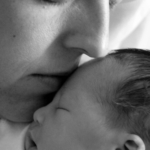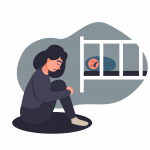Although new mothers describe breastfeeding as a meaningful and fulfilling aspect of caring for their infants, breastfeeding is also a common source of stress and anxiety. Breastfeeding self-efficacy or BSE refers to a mother’s confidence in her ability to breastfeed her infant. While previous studies have focused on the relationship between postpartum mood and breastfeeding, little is known about how breastfeeding self-efficacy may affect mood.
A recent study prospectively evaluated breastfeeding self-efficacy (BSE) and mood in first time mothers who initiated breastfeeding at 2 days, 6 weeks, and 6 months postpartum.
According to psychologist Cindy-Lee Dennis: Breastfeeding self-efficacy refers to a mother’s confidence in her ability to breastfeed her infant and it predicts: (1) whether a mother chooses to breastfeed or not; (2) how much effort she will expend; (3) whether she will have self-enhancing or self-defeating thought patterns; and (4) how she will emotionally respond to breastfeeding difficulties. Breastfeeding self-efficacy is influenced by four main sources of information: (1) performance accomplishments (e.g., past breastfeeding experiences); (2) vicarious experiences (e.g., watching other women breastfeed); (3) verbal persuasion (e.g., encouragement from influential others such as friends, family, and lactation consultants); and (4) physiological responses (e.g., fatigue, stress, anxiety). It is hypothesized that health professionals may enhance a mother’s breastfeeding confidence by altering these sources of self-efficacy information.
High BSE at 2 days postpartum predicted positive emotional adjustment and fewer depressive symptoms at 6 weeks postpartum, and exclusive breastfeeding at 6 months postpartum was more common among women who exhibited high BSE at 2 days. Breastfeeding concerns were among the most commonly named reasons for stress, along with sleep deprivation and lack of social supports.
These findings are consistent with a previous report indicating that postpartum depression was more common in women who attempted to breastfeed but experienced difficulties doing so. The cessation of breastfeeding was associated with risk for subsequent depression; however, postpartum depression was far more likely in those women who stopped because they were having problems (e.g., pain, breast infection, low milk production, problems with baby latching or sucking) than in those women who stopped breastfeeding for other reasons.
These studies underscore the importance of supporting mothers who choose to breastfeed. If we intervene early and support women and their efforts to initiate breastfeeding, we may be able to increase rates and duration of breastfeeding. And helping new mothers to achieve success in this important aspect of mothering may decrease stress and help build a stronger sense of competency, factors which may help to reduce risk for postpartum depression.
On the other hand, I strongly believe that supporting mothers in their efforts to breastfeed also means allowing or advising them to stop breastfeeding when they are having significant or unresolvable difficulties and helping them to feel comfortable with this decision. Far too often, women feel ashamed and inadequate as mothers when they cannot (or choose not) to breastfeed. Being a new mom is stressful enough, we don’t have to make it worse.
Ruta Nonacs, MD PhD
Henshaw EJ, Fried R, Siskind E, Newhouse L, Cooper M. Breastfeeding Self-Efficacy, Mood, and Breastfeeding Outcomes among Primiparous Women. J Hum Lact. 2015; 31(3): 511-8.








Leave A Comment